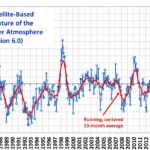‘Barbecue summer 2009’.
Mijn rol als onderzoeksdirecteur [van het KNMI] werd door de mensen om me heen primair beleefd als degene die zorgt voor de volgende nóg grotere computer. Maar ik wilde doordringen tot de kern van het probleem. Zijn die modellen waarmee we voorspellen wel betrouwbaar? Dat vond men niet leuk. Zoeken naar de waarheid? Ben je bedonderd! Als dat betekent dat je moet erkennen dat modelberekeningen tekort schieten?
Henk Tennekes, 2010
Met Office officials lobby for more money for bigger computers to be more precisely wrong in future.
Peter Lilley, 2015
In de klimaatdiscussie beweren aanhangers van de menselijke broeikashypothese (AGW = ‘Anthropogenic Global Warming’) vaak dat als je ziek bent en negen van de tien dokters je een bepaalde behandeling aanraden, je dit advies opvolgt. Daarmee bedoelen ze dat bijna alle klimatologen AGW aanhangen en we dus maar de beleidsaanbevelingen moeten volgen die uit de wetenschappelijke ‘consensus’ volgt.
Maar die redenering kan gemakkelijk worden weerlegd. In de eerste plaats bestaat die zogenaamde consensus – een vast onderdeel van de misleidende klimaatpropaganda – helemaal niet, zoals ik al zo vaak heb geschreven. Onlangs nog hier.
Voorts rijst de vraag wat te doen als al die dokters het bij het verkeerde eind blijken te hebben. Dan wil je toch wel een second opinion. Toch?
Klimaatsceptici hebben vaak gemopperd over de vooringenomenheid van de BBC ten aanzien van het klimaat. Samen met het Britse dagblad ‘The Guardian’ behoort deze zender tot de meest fanatieke apostelen van de klimaathype. Opmerkelijk was dan ook de recente uitzending van een radioprogramma van Quentin Letts, op BBC Radio 4, waarin deze milde en humoristische kritiek uitte op het Met Office (het Britse KNMI).
Beluister hier.
Onder de titel, ‘What a shower! The more money the Met Office gets, the more ludicrously inaccurate its doom-mongering on climate change’, schreef Christopher Booker in ‘The Daily Mail’ daarover:
Very surprisingly and somewhat boldly, on Wednesday morning Radio 4 put out a programme by the Mail’s Quentin Letts which ran flatly counter to the BBC’s normal party line on one of its very favourite subjects, global warming.
Under the title What’s The Point Of The Met Office?, Mr Letts focused on the way our national weather service has long been known to share with the BBC an obsession with climate change.
Indeed, the way this has in recent years tended to skew so much of its forecasting —remember the infamous promise of a ‘barbecue summer’ in 2009 just when the rain was set to fall for weeks? — has made it something of a national joke.
One of the guests interviewed by Mr Letts was the veteran Tory politician and climate-change sceptic Peter Lilley, who proceeded to poke fun about how Met Office officials would lobby for ‘more money for bigger computers to be more precisely wrong in future’. ….
Ook gaf Booker een overzicht van een aantal voorspellingen van de Met Office – ook al zo’n verkondiger van het broeikasevangelie – die er helemaal naast zaten.
CLAIM: At least three of the years after 2009 would be hotter than 1998.
REALITY: Though the Met Office would eventually claim that two of those years, 2010 and 2014, were warmer than 1998, independent experts soon demonstrated how they could only make such claims by continually ‘adjusting’ their more recent figures upwards from those originally published.
This practice, which has been widely criticised, sees the Met Office revisiting published temperatures without justifying why it is scientifically appropriate.
The Met Office uses what are called ‘surface temperatures’, measured by weather stations on land and sea. Those measured much more comprehensively by satellites still show that 1998 was easily the hottest year on record. Neither 2010 nor 2014 got anywhere near it.
CLAIM: We could look forward to many more extreme heatwaves, like that which had killed ‘15,000 people’ across Europe in 2003, just before the Met Office study began.
REALITY: We have yet to see any repetition of that 2003 heatwave, which even at the time other meteorologists said was nothing to do with global warming. It was a natural event caused by an unusual influx of hot air from the Sahara.
CLAIM: We could expect many more ‘extreme weather events’, such as abnormal rainfall.
REALITY: This simply hasn’t happened. Even though the Met Office did all it could to claim the rain that caused last year’s exceptional flooding, particularly in Somerset, was the worst ever recorded, its own records show that far more rain fell between November 1928 and January 1929.
CLAIM: All that mass of ice in Greenland would some time in the future melt, meaning sea levels would rise by more than 20ft and engulf major cities.
REALITY: A recent study of temperatures recorded in Greenland reveals no sign of this happening any time soon. In fact, going way back to 1900, there has been no upward rise in the trend of Greenland’s temperatures at all.
Away from the 2004-14 research, the Met Office gets its forecasts wrong with quite comical consistency.
In 2007, its computer predicted it would be the ‘hottest year ever’, just before global temperatures plummeted by 0.7c. That summer in the UK, it told us, would be ‘drier than average’, just before we experienced some of the worst floods.
Between 2008 and 2010, the computer models repeatedly predicted ‘warmer than average’ winters and ‘hotter and drier summers’ — three years when we had summers that were wetter and cooler than normal, including the ‘barbecue summer’ of 2009.
In October 2010, they predicted our winter would be up to ’two degrees warmer than average’, just before snow blanketed us in the coldest December since records began in 1659.
In November 2011, the Met Office computer forecast global temperatures rising by 2017 by as much as a staggering 0.5c, a prediction so embarrassingly off-beam that, a year later, it was removed from their website.
In March 2012, it predicted that spring would, yet again, be ‘drier than average’, just before the wettest April on record. In November 2013, the computer predicted Britain’s winter would be ‘drier than usual’ — just before three of the wettest months we have known.
Of course, the main reason the Met Office’s record has been so relentlessly dismal is that, as its 2004 report made clear, its computer models are programmed according to its conviction that the chief factor driving our climate is the steady rise in carbon dioxide (CO2).
Certainly, CO2 levels have continued to rise. But for 18 years, despite the Met Office’s increasingly desperate attempts to claim otherwise, those cussed temperatures have simply refused to rise in tandem, as their computer models predicted they should have done.
What makes this of far more than just academic interest is that the politicians who rule over us not only continue to believe what the Met Office tells them, but rely on it to justify our increasingly catastrophic energy policy. …
This makes the performance of a Met Office for which we pay £220 million a year not just a joke, but a major scandal. And well done the BBC for allowing Quentin Letts, for once, to point this out.
Aldus Christopher Booker.
Lees verder hier.
In het licht van het voorgaande behoeft het geen verwondering te wekken dat velen het onaangename gevoel bekruipt, dat de patiënten de macht in de psychiatrische inrichting hebben overgenomen.
Voor mijn eerdere bijdragen over klimaat en aanverwante zaken zie hier, hier, hier, hier en hier.






Men zou een klimaatmodel moeten maken waarin ook een parameter voor het koddigheidsgehalte wordt opgenomen. Ik verwacht een correlatie van 90% met miskleunen.
Nog steeds overtuigd van de relatie tussen T en CO2?
zonder CO2 zou de aarde een ijsbal zijn.
realitybias 28 dec 2015 12.02
Waar haal je die stelling toch vandaan? Nooit gehoord van het feit dat H2O in damp- en wolkvorm de belangrijkste component is die het broeikaseffect veroorzaakt?